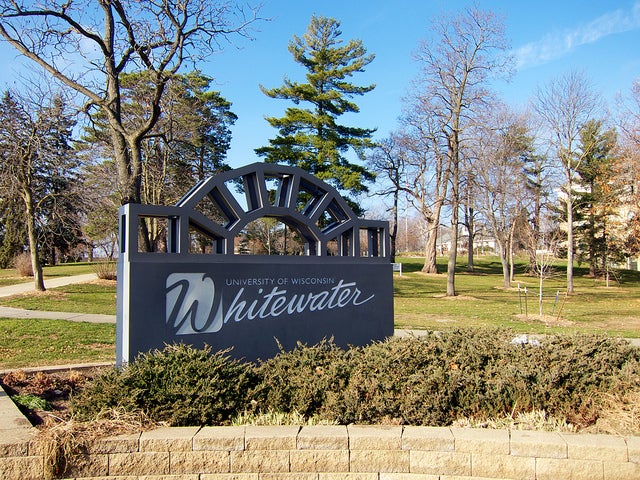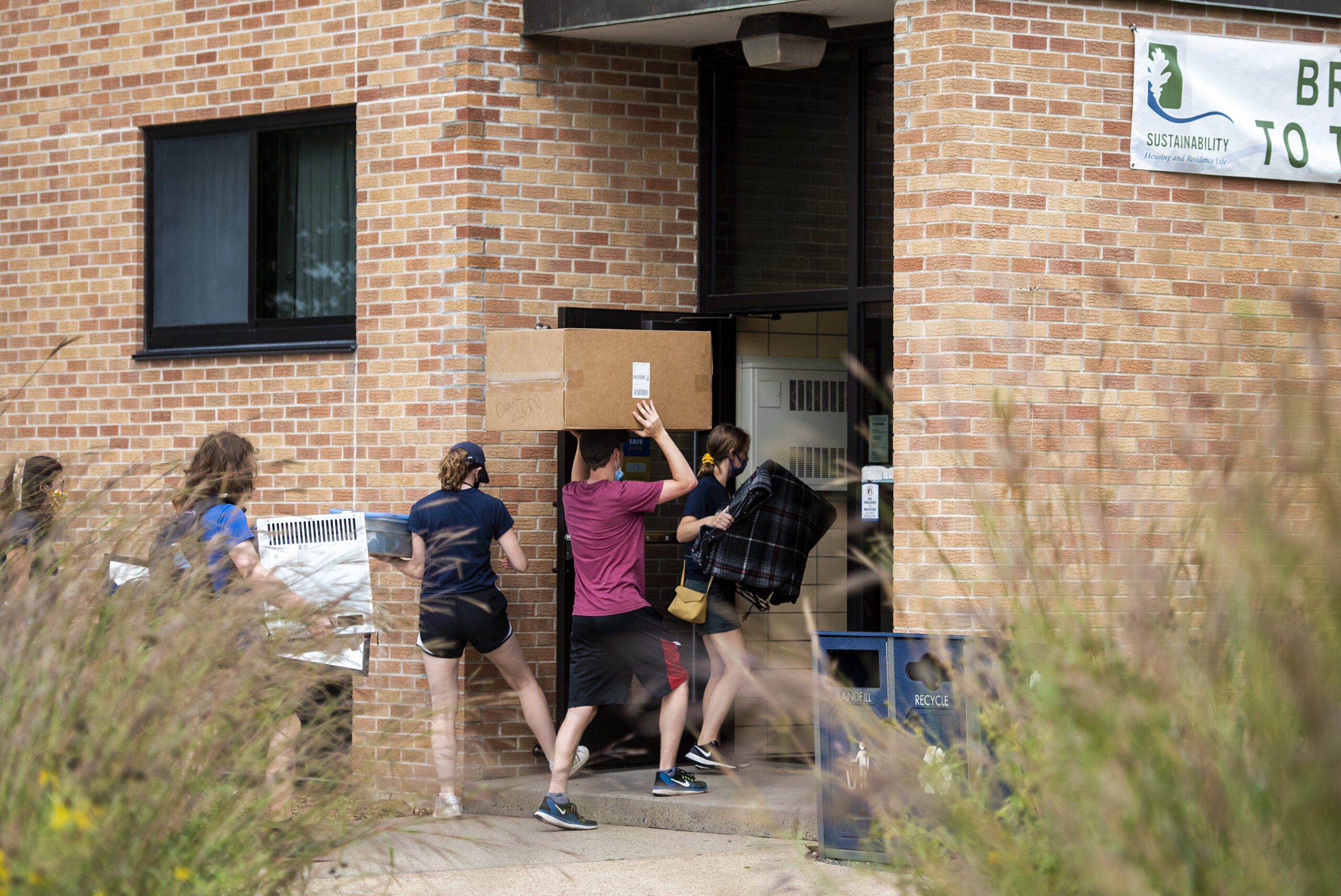The University of Wisconsin-Whitewater will cut $12 million from its budget over the next two years to make up for an $11 million drop in tuition revenues due to declining enrollment.
Chancellor Dwight Watson said a combination of cuts could include contract non-renewals, layoffs and reductions in professional development funds for faculty and staff.
In a letter sent to UW-Whitewater employees Thursday, Watson wrote that tuition revenue, which is a primary source of income for the university, has fallen since the 2016-17 academic year.
Stay informed on the latest news
Sign up for WPR’s email newsletter.
[[{“fid”:”980576″,”view_mode”:”embed_portrait”,”fields”:{“format”:”embed_portrait”,”alignment”:”right”,”field_image_caption[und][0][value]”:”%3Cp%3EUW-Whitewater%20Chancellor%20Dwight%20C.%20Watson.%20%3Cem%3EPhoto%20courtesy%20UW-Whitewater%3C%2Fem%3E%3C%2Fp%3E%0A”,”field_image_caption[und][0][format]”:”full_html”,”field_file_image_alt_text[und][0][value]”:”UW-Whitewater Chancellor Dwight C. Watson”,”field_file_image_title_text[und][0][value]”:”UW-Whitewater Chancellor Dwight C. Watson”},”type”:”media”,”field_deltas”:{“1”:{“format”:”embed_portrait”,”alignment”:”right”,”field_image_caption[und][0][value]”:”%3Cp%3EUW-Whitewater%20Chancellor%20Dwight%20C.%20Watson.%20%3Cem%3EPhoto%20courtesy%20UW-Whitewater%3C%2Fem%3E%3C%2Fp%3E%0A”,”field_image_caption[und][0][format]”:”full_html”,”field_file_image_alt_text[und][0][value]”:”UW-Whitewater Chancellor Dwight C. Watson”,”field_file_image_title_text[und][0][value]”:”UW-Whitewater Chancellor Dwight C. Watson”}},”link_text”:false,”attributes”:{“alt”:”UW-Whitewater Chancellor Dwight C. Watson”,”title”:”UW-Whitewater Chancellor Dwight C. Watson”,”class”:”media-element file-embed-portrait media-wysiwyg-align-right”,”data-delta”:”1″}}]]”This fall, we faced a drastic decline in enrollment — 4.1 percent,” wrote Watson. “That means we had 498 fewer students than the prior fall. The decline in enrollment has caused a decrease in tuition revenue of approximately $11 million from our peak enrollment in 2016.”
Enrollment in fall of 2019 was 11,586 at the main Whitewater campus. In fall of 2018, enrollment at Whitewater was 12,084 according to UW-Whitewater’s annual Fall Profile.
Watson, who was appointed as UW-Whitewater’s chancellor in August, said during past enrollment declines the campus had “robust reserves that allowed campus to weather challenges. That is no longer the case, and we must align our spending to the revenue we generate.”
The plan as it stands now is to cut operational expenses by $6 million in fiscal years 2020 and 2021. The cuts are not one-time reductions, he wrote.
Watson said the most immediate savings will come from potential cuts to employee staffing and benefits.
“I need you to understand that in order to meet our budget needs we will do some combination of contract non-renewals, reduction in appointment times and layoffs,” wrote Watson.
Among the list of potential budget reductions for campus are:
- Beginning July 1, professional development funds for faculty and staff would return to $1,000 for faculty, $500 for academic staff and $250 for university staff, which are half of current levels. Professional development funds are used by faculty and other teaching staff to attend trainings and conferences related to their field.
- An immediate moratorium on new tuition reimbursement requests. This is another employee benefit, which allows UW-Whitewater employees to take classes at UW institutions free of charge.
- Changing how the university purchases goods and placing new limits on purchasing cards used by some staff.
The chancellor also hinted at centralizing some operations to create efficiencies but didn’t offer specifics. Watson also said the university may pilot programs “that give employees greater flexibility to voluntarily take time off without pay.”
UW-Whitewater will make reinvestments aimed at increasing enrollment or preventing additional declines, Watson said. Those include working with an outside consultant to expand recruitment of Latinx students and students with disabilities, focusing on degree completion programs, expanding online degree programs and establishing guaranteed transfer agreements with technical colleges in Wisconsin and Illinois.
Lastly, Watson mentioned the campus is working on an “equitable compensation structure” aimed at supporting professional academic advising for students and expanding available student scholarships.
In the letter, Watson said “developing new sources of revenue for the university will be critical to our future fiscal stability.”
Ideas include launching new academic programs, new grant funding options and expanding the campus’ “transportation system to bring more people to campus.”
In response to an interview request with Watson, a UW-Whitewater spokesperson declined, saying there wouldn’t be any additional comments on the situation beyond the chancellor’s letter.
David Simmons chairs the UW-Whitewater Faculty Senate. In an interview with WPR, he said campus employees are still “trying to wrap their minds around” what the impacts of a $12 million cut over two years could be.
“I would say that most of the specifics we still need to learn more about,” Simmons said. “We’ve requested more information from members of the chancellor’s cabinet. We look forward to meeting with them next week.”
Simmons said with little left in the budget to cut there are worries on campus that educational quality could suffer as a result of significant cuts.
“Obviously, we’re most concerned about how benefits and compensation and layoffs will affect faculty and academic staff in particular,” said Simmons. “Primarily because the faculty at UW-Whitewater are committed to the academic mission of the university and we’re concerned that some of the proposals may have impacts that we would want to avoid.”
Nicholas Fleisher is an associate professor at UW-Milwaukee and chair of the Wisconsin chapter of the American Association of University Professors. He told WPR the budget issues at UW-Whitewater are the result of past cuts to the UW System, declining enrollment and a push started by state lawmakers in 2013 to make universities spend down what are known as tuition revenue reserve balances.
“The System has been spending down money and reserves and trying to be very, very loud and public about the fact that they’re doing that,” Fleisher said. “But now what we’re seeing is that at this point the reserves are very low or gone in some cases. What that means is that dip in enrollment causes a huge budget crisis.”
UW-Whitewater’s tuition fund balances were $15,558,366 in July of 2018. In July 2019 the reserve balance had dropped to $11 million with $3 million of that dedicated to the campus’ 2019-2020 budget according to UW System figures.
UW-Whitewater will hold listening sessions on campus from 3:30 to 4:30 p.m. Wednesday, Jan. 29 and from 10 to 11 a.m. Thursday, Jan. 30. The chancellor wrote he would also discuss the budget woes during the annual State of the University address Monday, Feb. 3.
Wisconsin Public Radio, © Copyright 2025, Board of Regents of the University of Wisconsin System and Wisconsin Educational Communications Board.





